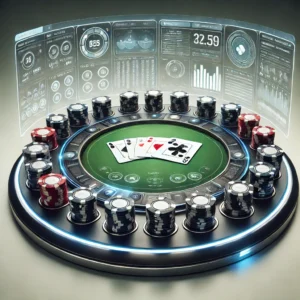Economic Impact of AR Poker
Augmented Reality (AR) is transforming traditional poker by blending physical and digital elements, creating a new form of immersive gaming. This innovation promises to revolutionize the poker industry, offering unique economic benefits and reshaping the player experience.
Enhanced Revenue Streams

AR poker brings a fresh and engaging experience to both casinos and online platforms. By integrating digital overlays with real-world environments, AR poker attracts a broader audience and enhances player engagement. This can lead to increased revenue for operators as they draw in first-time and casual players while encouraging existing customers to play more frequently.
The continuous engagement facilitated by AR poker can also lower operational costs for casinos. Virtual elements can simulate live-action poker without the need for physical venues or large staff, which reduces overhead expenses. These savings can be passed on to players through improved odds and bonuses, further driving player retention and revenue growth.
Elevating Play Through Augmented Reality
Immersive and Interactive Gameplay
AR technology enriches the poker experience by overlaying digital elements onto real-world settings. Players can view virtual cards, chips, and interactive elements through AR glasses or mobile devices, creating a dynamic and immersive environment. Customizable themes and backgrounds add a personal touch to each game, while animated visuals enhance the overall experience.
Real-time statistics and information, such as player odds and hand strength, provide strategic insights that elevate gameplay. These features help players make more informed decisions, making the game both more engaging and strategic.
Connectivity and Social Interaction
AR poker redefines social interaction by allowing players to see virtual avatars of their opponents in a shared digital space. These avatars mimic human movements and expressions, creating a more lifelike and interactive social experience. This aspect of AR poker fosters a sense of presence and connection that traditional online poker lacks.
Players can also invite friends to join games, regardless of their physical location, creating a virtual poker table where participants feel as if they are playing together in the same room. Social features such as chat functions and virtual high-fives further enhance the community aspect of AR poker, making it more appealing to players who enjoy social gaming.
Technological Advancements and Challenges
Progressions in AR Technology
The future of AR poker relies on advancements in AR hardware and software. New AR devices, such as Microsoft HoloLens and Magic Leap, offer higher resolution displays and better tracking capabilities, improving the realism and functionality of AR poker experiences. As these technologies become more affordable and accessible, AR poker is expected to gain broader adoption.
However, there are challenges to overcome. AR poker requires significant computational resources and high-speed internet to render digital elements in real time without lag. Ensuring that interfaces are intuitive and user-friendly is also crucial to provide a smooth and enjoyable gaming experience.
Regulation and Fair Play
Ensuring fair play and regulatory compliance is essential for the success of AR poker. Regulators need to develop frameworks that address the unique aspects of AR gambling, including virtual transactions and digital identities. Transparent algorithms and robust monitoring systems are necessary to prevent cheating and fraud.
Responsible gaming measures must be integrated into AR poker platforms to address the immersive nature of the experience. Features such as time and money limits, self-exclusion programs, and access to problem gambling resources are vital to promoting safe gaming practices.
Future Prospects of AR Poker
Innovations and Expansions
The future of AR poker looks promising, driven by advancements in technology and growing player interest. Enhanced graphics, user-friendly interfaces, and affordable AR devices will contribute to its wider adoption. The integration of artificial intelligence (AI) and machine learning can further personalize the gaming experience, offering customized interactions and recommendations.
Social AR platforms will also play a significant role in the evolution of AR poker. Virtual tournaments, leaderboards, and other social features will keep players engaged and foster a sense of community. As AR poker continues to evolve, it is set to become a leading trend in the gambling industry.
Conclusion
AR poker represents a groundbreaking development in the poker arena, offering immersive and interactive gameplay that blends physical and digital worlds. With its potential to enhance player engagement, reduce operational costs, and provide unique social experiences, AR poker is poised to revolutionize the gambling industry. As technology advances and regulatory frameworks adapt, AR poker will likely become a prominent and influential part of the future of gambling.



